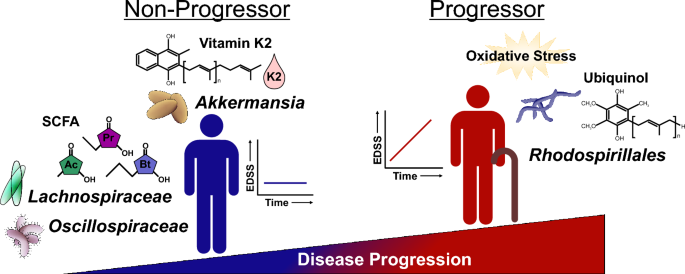Multiple sclerosis (MS) is a chronic autoimmune disease that affects the central nervous system (CNS) and is a leading cause of neurological disability in young adults. MS progression is influenced by a complex interplay of genetic and environmental factors, including the gut microbiome. Recent studies have sought to understand how the commensal gut microbiota impacts the severity and progression of MS, aiming to identify potential predictive biomarkers and therapeutic targets.
Key Findings
Microbial Associations with MS Progression:
- The study identified 41 bacterial species associated with worsening MS. Key findings included a marked depletion in beneficial bacteria such as Akkermansia, Lachnospiraceae, and Oscillospiraceae, and an expansion of potentially harmful bacteria like Alloprevotella, Prevotella-9, and Rhodospirillales.
- These microbial changes were linked to an increase in oxidative stress-inducing aerobic respiration and a decrease in beneficial metabolic functions such as microbial vitamin K2 production and short-chain fatty acid (SCFA) metabolism.
Predictive Value of Gut Microbiota:
- Statistical modeling demonstrated that the composition of the gut microbiota, in conjunction with clinical features, could predict disease progression. This suggests that gut microbiota profiles could serve as non-invasive biomarkers for MS progression.
- The study highlighted that constipation, a common gastrointestinal comorbidity in MS patients, exhibited a distinct microbial signature that was different from the microbial changes associated with disease progression.
Functional Implications:
- The inferred metagenomic analysis revealed that the microbial taxa associated with MS progression were involved in pathways that promote oxidative stress and reduce the production of vitamin K2 and SCFAs, compounds known for their anti-inflammatory properties.
- The findings suggest a potential role for microbial-induced oxidative stress and deficiencies in key microbial metabolites in driving MS progression, warranting further functional validation and mechanistic studies.
Methods
The study conducted a longitudinal analysis of 58 MS patients over an average of 4.2 years. Disability status was tracked using the Expanded Disability Status Scale (EDSS). Baseline fecal samples were collected and analyzed via 16S rRNA gene sequencing to characterize the gut microbiome. Statistical models were used to correlate microbial features with disease progression and to predict progression risk based on microbiota composition and clinical data.
Link to the study : https://tinyurl.com/2r8a5a9j
